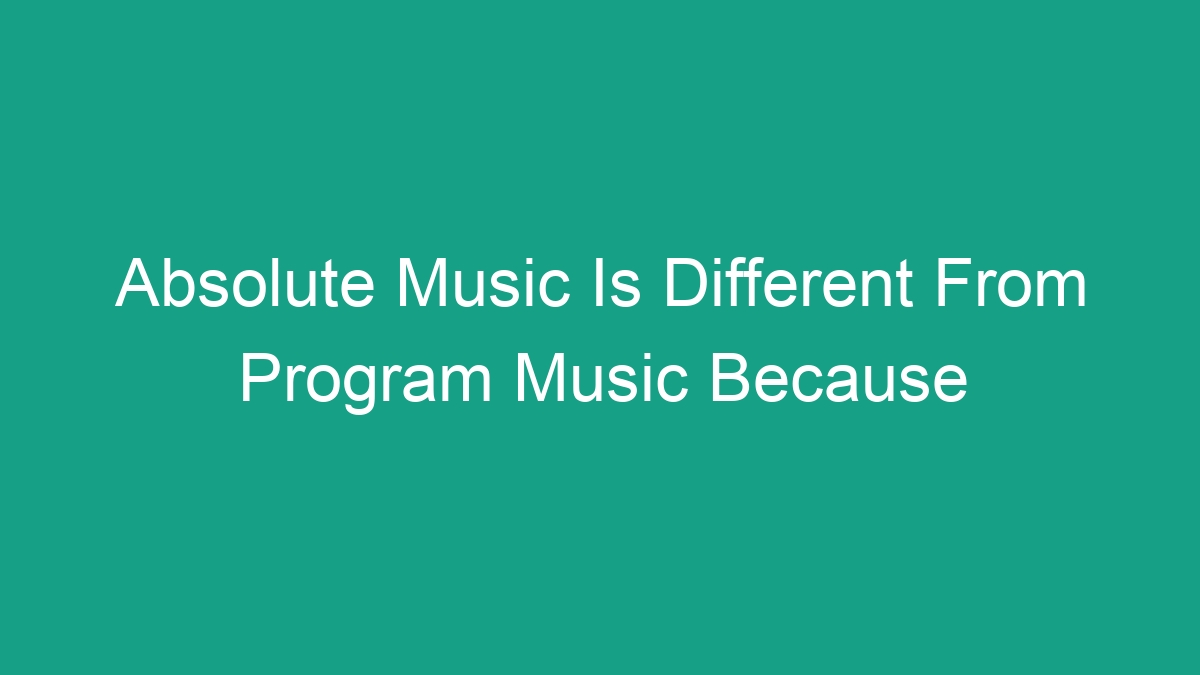
In the world of classical music, there are two main categories that compositions fall under: absolute music and program music. While both types of music strive to evoke emotions and connect with listeners, they achieve this in very different ways. This article will explore the key differences between absolute music and program music, and why these distinctions are important for both composers and audiences.
Absolute Music
Absolute music, also known as pure music or abstract music, is instrumental music that is not explicitly tied to any specific story, text, or image. This type of music is meant to be appreciated on its own merits, without any extramusical associations. Absolute music is often characterized by its focus on musical form, structure, and harmony, and it is regarded as an expression of the composer’s pure musical ideas.
Some key characteristics of absolute music include:
- Focus on musical elements: Absolute music puts a strong emphasis on musical elements such as melody, harmony, rhythm, and form. Composers use these elements to create compositions that stand on their own without the need for a narrative or program.
- Freedom of interpretation: Without a specific story or program to adhere to, absolute music allows for a greater degree of interpretation by the listener. Each listener may form their own emotional and intellectual connections to the music, as there are no predetermined associations to guide their understanding.
- Examples: Some well-known examples of absolute music include Ludwig van Beethoven’s Symphony No. 5, Wolfgang Amadeus Mozart’s Piano Sonata in C Major, K. 545, and Johann Sebastian Bach’s Brandenburg Concertos.
Program Music
In contrast to absolute music, program music is instrumental music that is explicitly intended to represent or evoke a particular idea, story, or image. The composer of program music provides the listener with a specific narrative or program to follow, and the music is composed with the intent of conveying this narrative through sound.
Key characteristics of program music include:
- Dependence on extramusical associations: Program music relies on extramusical associations, such as a story, poem, painting, or landscape, to help guide the listener’s understanding and emotional response to the music. These associations provide a framework for interpreting the music in a specific context.
- Descriptive elements: Program music often includes descriptive elements in the music itself, such as specific musical themes or techniques that represent characters, events, or emotions within the program. This allows the composer to paint a musical picture of the program’s narrative.
- Examples: Some well-known examples of program music include Richard Strauss’s “Also sprach Zarathustra,” which is inspired by Friedrich Nietzsche’s philosophical novel of the same name, and Pyotr Ilyich Tchaikovsky’s “Romeo and Juliet Overture,” which is based on William Shakespeare’s tragic love story.
The Key Differences
The primary differences between absolute music and program music lie in their approach to composition, interpretation, and the relationship between music and extramusical ideas.
- Intention: Absolute music is created with the sole intention of existing as music, independent of any specific outside influences. Program music, on the other hand, is composed with the explicit intention of conveying a particular narrative or program through the music.
- Freedom of interpretation: Absolute music allows for a wide range of individual interpretations, as listeners are not constrained by a predefined narrative. Program music, however, guides the listener to a specific understanding of the music through its extramusical associations.
- Emphasis on musical elements: While absolute music prioritizes musical form, structure, and harmony, program music places a greater emphasis on depicting specific extramusical elements within the music itself.
- Role of the composer: Composers of absolute music are focused on creating music that is complete within itself, while composers of program music are tasked with representing and interpreting external narratives through their compositions.
Why the Differences Matter
The distinctions between absolute music and program music are important for composers, performers, and audiences alike. Understanding these differences can lead to a deeper appreciation and interpretation of the music, as well as enriching the overall experience of classical music.
- Artistic expression: Composers can utilize the distinctions between absolute music and program music to express their creative intentions in a more deliberate and nuanced manner. Whether aiming to create a self-contained musical masterpiece or to depict a specific narrative, composers can tailor their approach to composition to better achieve their artistic goals.
- Listener engagement: For audiences, recognizing whether a piece of music is absolute or programmatic can enhance their engagement and understanding of the music. By knowing whether to approach a piece with an open mind for personal interpretation or with an awareness of a predefined story, listeners can more fully grasp the composer’s intentions.
- Performance considerations: Performers can approach absolute music and program music with different interpretive strategies, informed by the distinctions between the two categories. By understanding the underlying narrative or lack thereof, performers can bring out the essence of the music in a way that aligns with the composer’s intentions.
Conclusion
In summary, absolute music and program music represent two distinct approaches to composing and interpreting instrumental music. Absolute music stands as a testament to the power and beauty of music in its purest form, while program music offers a compelling means of expressing extramusical narratives through the medium of music. Understanding these differences is crucial for both composers and audiences, as it allows for a more informed and enriched experience of classical music. Whether reveling in the abstract beauty of absolute music or immersing oneself in the vivid imagery of program music, both genres offer unique and valuable contributions to the world of classical music.


